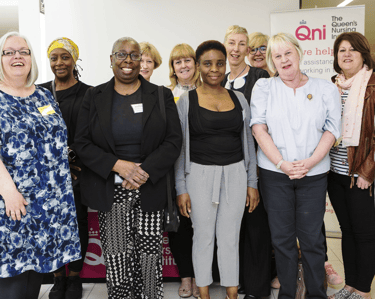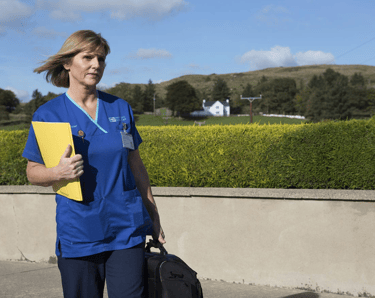The Queen’s Nursing Institute (QNI) is a charity that supports nurses who work in community settings and in social care––mainly nurses practising outside of the hospital environment, including District Nurses, General Practice Nurses, School Nurses, Occupational Health Nurses and Health Visitors.
QNI's History
The charity was originally established to train District Nurses, who from the mid-19th century brought healthcare to people in their own homes, in particular, the poor who could not afford to consult a doctor. Florence Nightingale was one of the prime movers in creating the new charity, as she firmly believed that it was often better to treat people at their homes rather than at hospitals, if at all possible. QNI is built on the backbone of this principle and the NHS England Long Term Plan has now enshrined this as a national policy, 130 years later.
The District Nurses who were trained by the QNI became the first Queen’s Nurses––a title that was reintroduced in 2007 with new criteria. All community nurses with at least five years’ experience are able to apply for the title, and there are now over 1400 Queen’s Nurses in England, Wales and Northern Ireland (the title also exists in Scotland but it is awarded by our sister charity there). Applications are closed for this year but we hope to reopen for new applications in early 2021––so please keep an eye on our website for updates.

QNI's Mission
At its heart, QNI is an educational charity, publishing professional guidance for nurses, creating standards of education and practice for community specialisms and giving academic awards and educational grants. In recent years, we have also expanded the number of learning events and conferences that we organise––until this year, when things have been put on hold because of the pandemic.
We have been gathering as much useful information around Covid-19 as we possibly can, which can be found in our Coronavirus Information Centre. We have also recently issued a call for case studies about how services have adapted to the ‘new normal,’ for example, by doing remote consultations with patients, and this information will be presented to our nursing community in the near future. We anticipate that as new technology continues to adapt, we will continue to see new nursing innovations in coming months and years.
We have quite a few specialist programmes: for example, our Homeless Health Programme, which is free to join, provides information and resources for nurses and allied health professionals working with people who are without a secure home. In relation to the programme, we have just released some new guidance about food, nutrition and homelessness.
New Ventures
At the beginning of this year, we also launched a new Care Home Nurses Network, supported by CNO England and the RCN Foundation. Well before the coronavirus crisis, it was acknowledged that a huge number of very vulnerable people were being nursed in care homes and, while many of them had complex health care needs, often compounded by having dementia, the nurses working in these settings were often overlooked by media and policy makers. Since the pandemic, we have seen a greater focus on care homes. We hope this will continue and will draw in more investment to this sector in order to improve care for residents. QNI plans on holding some online learning events very soon specifically for this network.
We also offer other forms of support. This year, we realised that we needed to offer a ‘listening ear’ to nurses who were under enormous pressure in their workplace. We set up a listening service, ‘TalkToUs’, where any nurse working in the community or social care can arrange a call with one of our trained staff, who are all Queen’s Nurses themselves. We do also offer financial assistance for nurses in need; check out QNI's Help for Nurses to learn more.

Partnerships
We work with a lot of other healthcare organisations and charities; for example, the Burdett Trust for Nursing, which funds a lot of our innovative work. We also have a great partnership with the National Garden Scheme, which was actually created by the QNI in 1927. The garden scheme has grown to become one of the biggest funders of healthcare charities in the UK and they give vital support to our Queen’s Nurse programme. They have also helped drive the agenda around gardens and health, particularly mental and emotional health, and the growing field of social prescribing.
In addition, we offer various forms of leadership development for nurses at various stages in their career; check out the QNI Twitter and Facebook pages for more information. The QNI Blog comprises of publications by nurses to help share knowledge and inspiration and welcomes posts from the nursing community, regardless of background, experience or specialism, so get in touch with QNI directly or the Rohme team to learn more.
Rohme thanks Matthew Bradby, Head of Communications at QNI, for joining us as a guest blogger. He has worked for a number of voluntary organisations in the UK and the US, in areas including health education, youth work, environment, wildlife and heritage, including the Charity Commission for England and Wales.
If you would like to participate in Rohme's Nurse News, please contact Pooja Nerurkar at pooja@rohme.uk.
